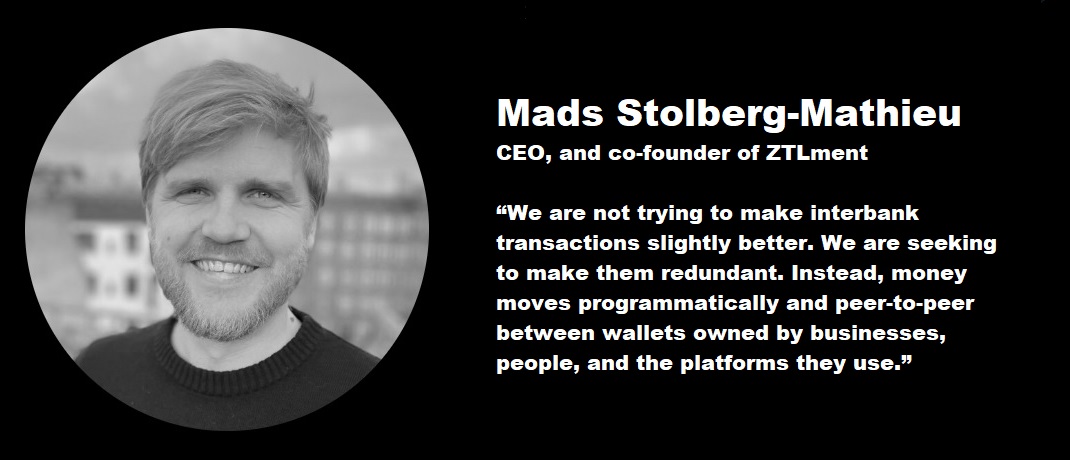
Copenhagen-based fintech startup, ZTLment, has made waves as the first in Europe to pioneer compliant wallet infrastructure on decentralised rails for ordering- and booking platforms. „Having raised €2.4 million in total pre-seed funding, ZTLment aims to eliminate the need for outdated banking infrastructures once and for all and make it easy to make programmable and peer-to-peer payments.” – according to the press release.
Led by the three co-founders, Mads Stolberg-Mathieu, Harry Kearney, and Jason Spasovski, the company said „is the first in Europe to figure out how to do fiat money transfers on decentralised rails in end-to-end compliance with Europe’s open banking law”.
ZTLment’s approach addresses the longstanding challenges faced by ordering and booking platforms, including automating fund flows, enhancing payment transparency, and maintaining regulatory adherence. It also addresses a broader shift in the market between finance- and product teams.
“We are seeing a transition, where payment operations become so important for the platform user experience that it is carved out of the finance function and handed over to the product team”, explains Mads Stolberg-Mathieu – CEO, and co-founder of ZTLment.
Commercially, the company makes this transition easy without its customers having to recruit expensive payment operations specialists that can easily cost €70k or more per year.
The company does this by offering Compliant Wallet Infrastructure. Each platform customer is empowered with an unlimited number of wallets to streamline payments efficiently and transparently without the burden of navigating – or having to worry about – technical or regulatory complexities. With an upcoming product launch, customers can allocate a multicurrency wallet for every platform vendor, facilitate split payouts, and release funds in escrow based on data events – all without worrying about the underlying rails.
“People outside of crypto don’t care what ledgers you use, as long as it is fiat money and regulatory compliant. They do care about the functionality though”, says Stolberg-Mathieu.
The potential of programmable payments, like ZTLment is bringing to market, has been widely recognised by global institutions like Citi, HSBC, JP Morgan, and even the Bank of International Settlements, which is often regarded as the central bank for central banks.
“Blockchain provides programmability, integrity, and 24/7 availability without a single point of failure. All of this is massively valuable for financial transactions”, explains the Head of the European Blockchain Center and Professor at the IT University of Copenhagen, Roman Beck. He adds: “Automated, instant, and integrated payments can ultimately help mitigate the 2.5 trillion dollar gap in trade finance, which is holding back growth for millions of SMEs”.
Leading investor, Richard Breiter, envisions a future where ZTLment’s technology not only benefits digitally native platforms but also transforms traditional trade finance processes within global supply chains:
“The ability to lock and unlock money between multiple parties based on data events will help create trust, transparency, and workflow efficiency in cross-border transactions. It also provides a foundation for letting AI agents decide when to release funds while setting limits on the amounts,” states Richard Breiter, partner and co-founder of the PSVTech01 fund.
But what is the difference between what the big banks are doing and the product offered by ZTLment?
“We are not trying to make interbank transactions slightly better. We are seeking to make them redundant. Instead, money moves programmatically and peer-to-peer between wallets owned by businesses, people, and the platforms they use”, explains Stolberg-Mathieu.
ZTLment’s Compliant Wallet Infrastructure
European online booking platforms, just like every online business that is involved in payments in the EU, need to comply with the payment service directive also known as PSD2. These platforms sometimes underestimate the resources needed to respect the law, which often implies costly, time-consuming procedures and the necessity to hire specialised expertise.
Moreover, PSD2 regulations impose strict requirements on online platforms regarding the handling of users’ funds, necessitating either obtaining a license or relying on outdated financial systems. Both options can be costly and cumbersome for platforms, presenting significant challenges in managing financial transactions efficiently and compliantly.
„ZTLment’s Compliant Wallet Infrastructure aims to revolutionise this landscape by offering online platforms and marketplaces highly customisable payment flows tailored to fit their specific products and needs. This is made possible through the four core components of the Compliant Wallet Infrastructure: embedded wallets, event-based payments, built-in escrow wallets and embedded anti-money laundering and terrorism financing controls.” – the company said.
Stolberg-Mathieu added: „Seamless interaction with money is now so important for the user experience and platform functioning that the responsibility for managing the payment operations often gets anchored with the product team. Our Compliant Wallet Infrastructure (launching soon!) makes it easy, fast, and affordable for the product and operations people to manage this responsibility without recruiting specialists or spending big on legal – thereby bringing savings of €100k or more.
Our key offering? Flexibility. We enable programmable and peer-to-peer payments in end-to-end compliance with EU’s open banking regulation so that customers don’t have to deal with technical or regulatory complexities.„
Related content: Introducing ZTLment’s Compliant Wallet Infrastructure for online booking platforms and marketplaces
Banking 4.0 – „how was the experience for you”
„To be honest I think that Sinaia, your conference, is much better then Davos.”
Many more interesting quotes in the video below: